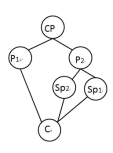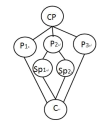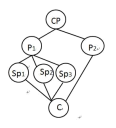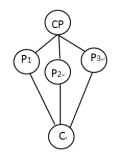1 . Benefits of Cross-Country Skiing
Cross-country skiing can be enjoyed by a wide range of students, from the youngest kindergartners to those secondary students. It is really a fun activity, providing students a gentle workout outside in winter. While having fun, students can gain physical and mental benefits .
The physical benefits of cross-country skiing are well known. If we look at Olympic cross- country skiers, we can see the positive effects on the body that result from training for cross-country skiing. The average best female cross-country skier carries 11 percent body fat, and best male skiers carry 5 percent. These percentages are well below the average for people who are considered to be athletic-17 percent for females and 10 percent for males. The high number of calories burned while skiing helps to keep skiers slim in a healthy and attractive way.
Cross-country skiing is also an efficient way to exercise a large number of muscles at once. Because skiers use ski poles as a means of propulsion, the force that drives skiers forward, the upper body gets much more of workout. Of course, the leg muscles also do their fair share. People who use cross-country skiing as a workout over several weeks will discover that the muscles of their entire body increase in strength.
Cross-country skiing on a regular basis has a tremendous effect on a person’s cardiovascular system. In addition to gaining strength in the muscles of the upper and lower body, people who use cross-country skiing as a workout method over several weeks will also discover that their heart is stronger. A strong heart pumps more efficiently, sending out more blood to the muscles with each contraction. Through weeks of skiing, people often discover that their resting heart rate has decreased. Highly trained Olympic cross-country skiers have resting heart rates between 28 and 40 beats per minute. Compare that to the resting heart rate of the average person, which is 60 to 80 beats per minute!
The benefits of cross-country skiing extend beyond overall general health. A lot of evidence exists indicating that regular physical activity increases the release of mood-lifting endorphins in the body. After one of the energetic and fun skiing lessons, students will be smiling and laughing; they will be relaxed and in a better mood than when they started class. Students will leave class with a sense of accomplishment, knowing that they have developed new skills in a fun activity.
Cross-country skiing is a great way to work the total body. Now more and more students are taking part in this exercise outside during the winter months. They are enjoying it and benefiting from it!
1. The underlined word “workout” means ______.| A.manner | B.exercise | C.application | D.opportunity |
| A.requires the use of most muscle groups | B.offers students a unique way to keep fit |
| C.can increase the athletes’ resting heart rates | D.can balance out the skiers’ increased calories |
| A.By making comments. | B.By giving examples. |
| C.By making comparisons. | D.By giving explanations. |
CP: Central point P: Point Sp: Sub-point (次要点) C: Conclusion
A. | B. |
C. | D. |
2 . 
At age 12, Keegan Sobilo of New Baltimore carefully tucks his legs and arms into a fire suit, pulls on a helmet and climbs into a race car that exceeds 80 mph. He has been doing this since age 8.
“ At first, I was scared to death. I was like, 'Let's do bowling or swimming. ' It's still very scary.But he knows what he's doing. Your heart goes out on that track every time he goes out there," said his mother Hillary Sobilo.
"The sixth-grader always wears pajamas to the track every night and takes them off when he puts his race clothes on. He's been doing that for the last four years. That's his trademark,” said Tim Phillips, his crew chief. The first time he wore his train pajamas to the track, Keegan went from last place to ninth place. He decided they brought luck. Since then, he has won a series of championships.
Passion for cars runs in the family. Keegan's father is a design mechanic at Fiat Chrysler Automobiles. He knows what it means to have seats and roll cages built to fit his son's body."What I see in Keegan is passion, like how I feel about car restoration. But for him, everything has to align itself. I tell my son you have to be the perfect package. Winning races every weekend is not the only key. More importantly, you have to have the right name, you have to look the correct way, speak the correct way, and act the correct way. Then the rest of it is really luck, like the stock market. If you don't put yourself out there,you'll never hit it big."
While Keegan's classmates play basketball and volleyball,Keegan is at the Birch Run track-practicing, qualifying and racing until 10 p.m. or 2 a.m. While many children spend time playing video games, Keegan runs race simulation training with his joystick after school.
"The kid is cool.It was like having a grandson. We showed respect to each other. And he takes it very seriously," said competitor Mike Todd, 69 , of Galesburg, Michigan." He's an older soul in a young man's body. I'd like to see him make it big. He's got the willpower."
1. Keegan enjoys ______| A.swimming |
| B.racing cars |
| C.bowling |
| D.playing games |
| A.Victory. |
| B.Safety. |
| C.Good qualities. |
| D.Real luck. |
| A.Keegan spends a lot of time practicing |
| B.the train pajamas bring Keegan success |
| C.Keegan's mother worries about his studies |
| D.Keegan picked up the hobby at the age of 4 |
3 . Gidda’s Team
The door closed behind Malik, making Mama look up from the hot meal. “Just in time for dinner. Will you
Gidda was staying in Malik’s bedroom. He didn’t
At dinner, Mama asked Malik, “How’s your
Malik was captain of school soccer team, and he had to discuss a fundraiser with the coach. They’d have to raise hundreds of dollars to
Unwillingly, Malik said, “It’s just team stuff.” Changing the
Gidda agreed. In the soft warmth of the evening, Gidda settled herself beneath the enormous fig(无花果) tree. “Feels like home,” she said. But Malik
The next morning, Malik found Gidda making fig cakes in the kitchen. She offered him one. Malik, hoping it wasn’t too awful, put it in his mouth. His eyes
Malik grabbed his phone and started
“Gidda’s Fabulous(极好的) Fig Cakes!” Malik said. “We’ll
At dinner that night, Gidda shared their plan with Mama, smiling
The next day, the kitchen was full of
As Malik
When the new
| A.watch | B.fetch | C.visit | D.serve |
| A.allow | B.enjoy | C.consider | D.mind |
| A.looked | B.handed | C.tripped | D.turned |
| A.useless | B.unlucky | C.scared | D.nervous |
| A.training | B.appointment | C.negotiation | D.meeting |
| A.buy | B.replace | C.iron | D.abandon |
| A.brilliant | B.random | C.original | D.personal |
| A.plan | B.attitude | C.subject | D.way |
| A.repeated | B.reported | C.explained | D.complained |
| A.picture | B.test | C.bite | D.break |
| A.widened | B.moved | C.focused | D.opened |
| A.produce | B.donate | C.deliver | D.exchange |
| A.running | B.texting | C.shouting | D.thinking |
| A.present | B.send | C.sell | D.reserve |
| A.prepare | B.show | C.choose | D.write |
| A.proudly | B.politely | C.shyly | D.bitterly |
| A.tension | B.hope | C.praise | D.energy |
| A.promised | B.predicted | C.announced | D.identified |
| A.socks | B.boots | C.uniforms | D.gloves |
| A.back | B.away | C.down | D.around |
4 . Four teams of mountaineers set out on a race to conquer(征服) an unclimbed mountain peak in the Himalayas. The Canadian team chose a long, but safe route, while the British, Chinese and Russian teams chose a faster but steep and dangerous route up the mountain.

When night fell, the teams made camp on the mountainside. But the next morning, the sun rapidly rose air temperature and the strong wind caused a heavy snowfall, which led to a terrible avalanche. The disaster struck and some members of the British, Chinese and Russian teams were swept away and killed. But the Canadians didn’t know what had happened.
It was an hour after the disaster and there was no hope of finding any survivors. The leaders of the British, Chinese and Russian teams, met to discuss how to successfully keep all the survivors alive.
| Britain | Russia | China | |
| Members | 3 | 2 | 2 |
| Tents | 1 two-man | None | 1 four-man |
| Sleeping bags | 3 | 2 | 2 |
| Rope | 25 metres | 50 metres | None |
| Food | 1 person for 3 days | 2 people for 4 days | 2 people for 2 days |
| Medicine | None | None | None |
The table above was a summary of what they could collect. The leaders made a final decision that they had to find a way to conquer the mountain and put their flags on the peak.
1. What kind of route did the Chinese team choose?| A.A long but safe route. | B.A short but dangerous route. |
| C.A separate but flat route. | D.An unknown but steep route. |
| A.High temperature. | B.An avalanche. |
| C.Strong wind. | D.A heavy snowfall. |
| A.The supplies and equipment they had left. |
| B.The plan of their follow up climbs. |
| C.The survey of their damages and injuries. |
| D.The difficulties they would meet. |
| A.give up the race | B.keep climbing |
| C.ask for help | D.look for the survivors |
| A.A business newspaper. | B.A health guide. |
| C.A culture magazine. | D.A nature journal. |
5 . Is It a Healthy Interest?
The Guinness Book of World Records describes Ranulph Fiennes as the world’s greatest living explorer. His journeys include the first polar circumnavigation (极地环行) and the first unsupported crossing of the Antarctic continent on foot. So when he suffered a heart attack, it came as something of a surprise.
Exercise is highly beneficial as it reduces both the pulse (脉搏) rate and the blood pressure so reducing stress on the heart as it brings blood round the body. It also helps to keep the artery (动脉) walls more elastic (有弹性的).
But can you push yourself too much? On the subject of exercise, it is good to take several parts of “moderate” exercise a week,which is a little more than quick walking. “We need to be careful when we’re doing extreme sports,” says expert Len Almond. “Extreme stress can make almost impossible demands on the body’s ability to recover. The stress of extreme sports forces biochemical changes in the body, and the physical response to that kind of activity will be too extreme.”
We all know how the Olympics began. The man who ran 26 miles from the town of Marathon to Athens with news of a victory died as soon as he arrived,and the cause of his sudden death might be the heart attack. Further research was done by scientists. They studied cyclists (自行车运动员) on a race that covers 230km with a height change of 5,500m. They were interested in one particular enzyme (酶), high concentrations of which are found in those who have suffered a heart attack. The scientists found that levels of this chemical increased in most of the cyclists who completed the race. The largest increases were seen in the fastest cyclists who had trained the hardest.
Most of us will never put our bodies to such extreme sports. But if, when you hear about someone like Fiennes,you ask whether exercise is worth it. I advise you to consider your own condition. Personally, I agree with the saying: “Run not to add years to your life but to add life to your years.”
1. According to the passage, taking exercise can_______ .| A.speed up the heart rate | B.increase stress on the heart |
| C.reduce the blood pressure | D.keep the artery walls straight |
| A.Our bodies can easily deal with physical stress. |
| B.Playing extreme sports is harmful to the human body. |
| C.We need a long period of recovery after extreme sports. |
| D.There is more to learn about the effect of physical stress. |
| A.To suggest a different area of research. |
| B.To support the activity of taking part in sports. |
| C.To explain the effect of a height change on cyclists. |
| D.To prove that extreme sports may cause heart attacks. |
| A.helps you have a regular life | B.adds years to your life |
| C.should be done in moderation | D.will be worth the effort |
6 . A number of studies show that sports and other physical activities can contribute to the development of self-esteem (a feeling of pride in oneself). For example, Canadian scientists found that sixth-grade students who were more physically active had considerably higher levels of self-esteem. A study in Switzerland found that teenagers who took part in sports clubs were healthier, including being better socially adjusted, feeling less anxious, and generally being happier about their lives. Similar findings were reported in a study of Latino students, where participation in school sport was found to be greatly associated with self-esteem.
There seems little doubt that part of the potency (潜能) of sports lies in their social setting. There are a lot of facts showing the importance of social connectedness (关联性) for healthy child and teenager development, and sports offer a popular and engaging setting for social interactions. Involvement in team sports has been positively associated with social acceptance and a sense of belonging, especially where such involvement is characterized by positive coaching, progressive skill development, and peer support.
But, the social setting of sports can exclude as well as include. There is now evidence that boys’ and girls’ experiences of sports can be very different, and this can affect the contribution they can make to the self-esteem of players. Peer acceptance seems to be an important factor in determining the relationship between sport participation and self-esteem, and girls can be particularly sensitive to negative judgments. And studies have found that many ‘girly’ boys and girls benefit most from non-competitive physical activities.
So, a note of caution ought to be sounded in case sports are considered to be a cure. Much of the literature on the most positive psychological (心理的) outcomes associated with childhood and youth sports stress the absolute importance of positive experiences. It will surprise no one that bullying, excluding or abuse experiences will harm, rather than support the development of self-esteem, and well-being in general. Sadly, it will also not be a shock to learn that many children’s introductions to sports are far from improving the quality of life.
The great developmental psychologist Jean Piaget argued that the foundations of self-esteem were laid between the ages of about 6 and 11 years of age. Importantly, this is also the time when children are most likely to be introduced to sports. We should know the importance of positive early sporting experiences for the development of both self-esteem and on-going participation in sports and other physical activities. Teachers, coaches, and parents have a responsibility to ensure that these experiences ‘catch’ as many children as possible, and for this to happen they need to remember ‘the principles of child development’: Children are not mini-adults.
Problems arise when adults forget these principles, and kid themselves into thinking that they are coaching future Olympians or Super stars. Unluckily, evidence suggests that talented children are most likely to stand out when they are given time to develop, to play, and to remain children.
Children are not miniature adults, and their enjoyment of sports (and their self-esteem) can suffer when adults forget this!
1. Studies in Switzerland and Latino showed teenagers who often join in sports _____.| A.build self-esteem earlier |
| B.have more good experiences |
| C.are more sensitive to judgments |
| D.are healthier both physically and mentally |
| A.positive | B.critical |
| C.uncertain | D.tolerant |
| A.will be happier about their lives |
| B.are more likely to be attracted by competitive sports |
| C.should be treated by coaches and parents as super stars |
| D.will build self-esteem if given positive comment and support |
| A.Children Should Take Part in Sports |
| B.Sports Offer You a Better Teenage Life |
| C.Sports Experience and Building Self-Esteem |
| D.People Should Treat Teenagers Like Miniature Adults |
7 . Worth the pain in the end
I used to hate running. It seemed too hard and pushing outside my comfort zone was not something I was raised to do.
In fact, I wouldn’t have become a
“So start running again, why don’t you?” I was getting
So he picked it up again, and after about a year, I started to join him at the track (跑道). Just a few weeks later, Charles signed us both up for a five-kilometer race. I
But on
The gun went
The first kilometer was
“I don’t think I’m going to make it.” I was already breathing heavily and painfully aware of the group of runners pounding past me.
“No, you’re doing
“I can’t,” I said, barely audibly (听得见地).
He tried a different way to
After another minute I saw the three-kilometer
Miserable doesn’t even begin to describe
“You’ll be fine. You’ve got less than a kilometer to go.”
I rounded a corner and saw both sides of the street thick with people watching the race, all cheering the runners on. I willed my legs to keep going.
Then I looked up and saw the clock. The seconds ticking away (一分一秒地过去) gave me an incentive (助力). I knew that if I finished this race, I would have achieved something. So, I straightened up, and kicked it.
I had my arms held higher when I passed
“You did great! I’m so proud of you!” Charles was thrilled that I’d
“That was AMAZING! I want to do another race. This running stuff is amazing!” I proudly hugged my medal as we started to walk to the post-race festivities.
My lungs and my comfort zone both
| A.runner | B.traveler | C.racer | D.cheerleader |
| A.afraid | B.tired | C.aware | D.confident |
| A.thought | B.dreamed | C.hesitated | D.cared |
| A.race | B.sport | C.show | D.task |
| A.on | B.off | C.up | D.down |
| A.long | B.short | C.easy | D.tough |
| A.wrong | B.right | C.great | D.bad |
| A.disability | B.dishonor | C.disgrace | D.discomfort |
| A.advise | B.persuade | C.urge | D.force |
| A.signal | B.symbol | C.point | D.mark |
| A.how | B.what | C.when | D.why |
| A.by | B.over | C.across | D.through |
| A.ring | B.necklace | C.medal | D.scarf |
| A.done | B.made | C.taken | D.caught |
| A.developed | B.expanded | C.changed | D.progressed |
8 . One major reason Americans don’t get enough exercise is that they feel they don’t have enough time. It can be difficult to squeeze in the 75 minutes of aerobic (有氧的) exercise per week that federal guidelines recommend.
In a new analysis of 14 studies, researchers tracked deaths among more than 232,000 people from the U.S., Denmark, the U.K. and China over at least five years, and compared the findings with people’s self-reports about how much they ran. People who said they ran any amount were less likely to die than those who didn’t run at all.
The analysis is the latest to illustrate the benefits of running on the human body. It’s what we evolved (进化) to do.
| A.People may no longer hunt wild animals for their next meal. |
| B.The physical demands of running affect our body in a beneficial way. |
| C.Some people run to prevent disease, and others run because it makes them feel better. |
| D.Runners were 27% less likely to die for any reason, compared with nonrunners. |
| E.But researchers point out, to infer something like that, they need the whole population measured. |
| F.But new research suggests people may be able to get life-lengthening benefits by running for far less time. |
| G.The good news is that running more than 50 minutes per week wasn’t linked to additional protections against dying. |
1) 课间操的基本情况(时间、次数…);
2) 你们做课间操的感受。
注意:1. 词数不少于 50;
2. 开头和结尾已给出,不计入总词数。提示词:课间操 exercise between classes
Dear Jim,
_________________________________________________________________________________________________________________________________________________________________________________________________________________________________________________________________________________________________________________________________________________________________________________________________________________________________________________________________________________________________________________________________________________________
Yours,
Li Hua
1. 介绍稿件要求;
2. 告知投稿时间和方式;
3. 询问对方意向。
注意: 1. 词数不少于 50;
2. 可适当增加细节,以使行文连贯;
3. 开头和结尾已给出,不计入总词数。
Dear Jim,
__________________________________________________________________________________________________________________________________________________________________________________________________________________________________________________________________________________________________________________________________________________________________________________________________________________________________________________________________________________________________________________________________________________________
Yours,
Li Hua



